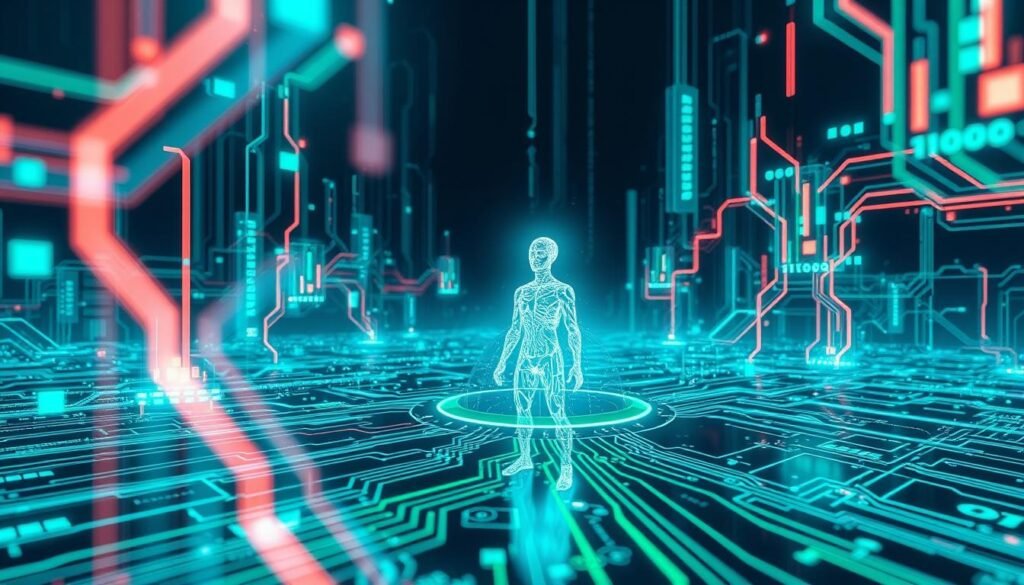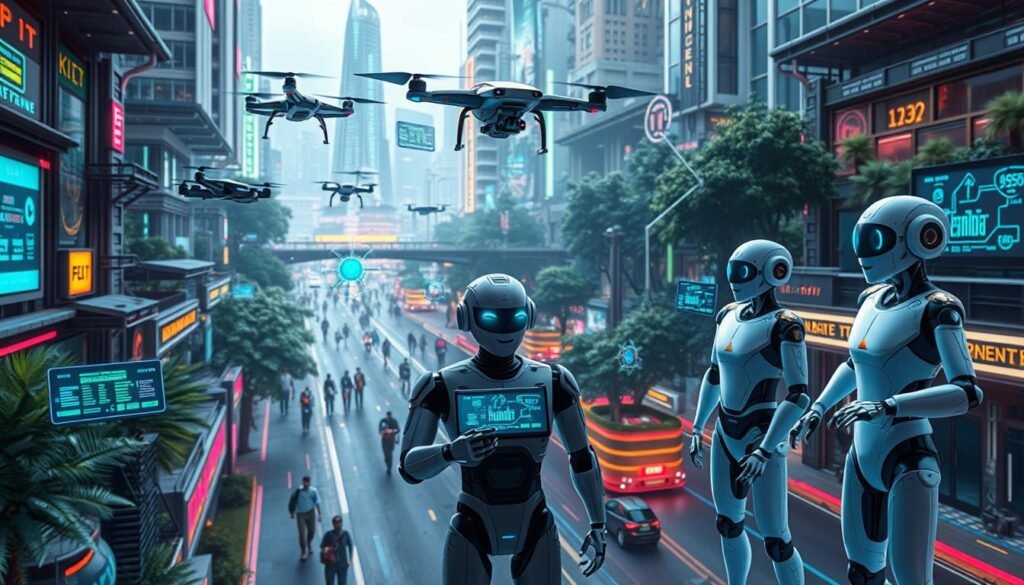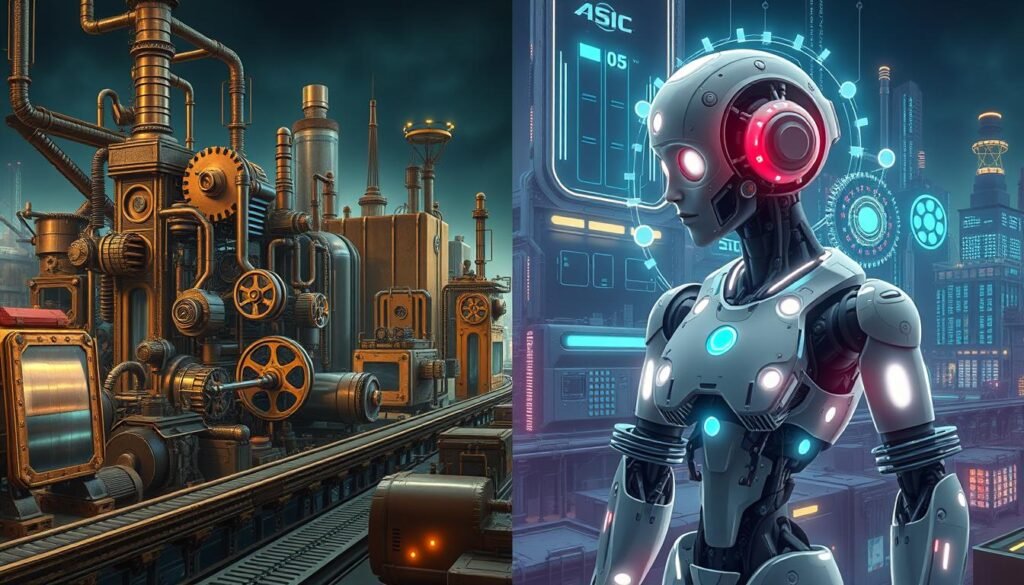Did you know that over 70% of companies plan to use AI agents by the end of the year1? This shows how important AI agents are for the future of work. So, what is an AI agent? It's a smart software system that works on its own, following rules or learning from data.
These agents are great at making quick decisions and adapting fast. In today's fast world, businesses can use them to work better and make smarter choices. This makes them stand out from old automation methods. As we dive deeper, you'll see the different types of AI agents, their uses, and how they change industries.
Key Takeaways
- AI agents are intelligent software systems that perform tasks autonomously.
- Over 70% of companies aim to adopt AI agents in their operations soon.
- They offer advantages like improved efficiency and better decision-making.
- The development of various AI agents caters to diverse operational needs.
- Understanding AI agents is vital for thriving in the modern business landscape.
Introduction to AI Agents
You are entering a world where AI agents, or cognitive agents, are key in many industries. These intelligent agent software programs collect data, make choices, and do tasks well. This helps businesses work better and make customers happier. By using an AI assistant, companies can manage things smoothly and offer services that fit what customers want, making things more personal2.
AI agents work in areas like healthcare, finance, and transportation. They learn and do complex tasks, from simple questions to solving big problems3. Their importance is growing, as they are seen as a major AI trend by 2025. They can work all the time, offering service day and night without the breaks humans need2.
Now, businesses are using AI agents to help people, not just replace them. This change has led to more training for employees to use AI well. This makes work more productive and satisfying for everyone3. As industries use these technologies more, the future of work will be closely tied to AI. This shows how AI agents can make work better and keep customers happy.
What Is an AI Agent?
An AI agent is a intelligent software system that can do things on its own. To understand what an AI agent is, we need to look at its definition and main features. This part will cover the basics that make AI agents different from regular systems.
Definition of AI Agents
An AI agent is like an autonomous agent that can see its surroundings, make choices, and take actions. It works towards specific goals. For example, a modern AI agent doesn't just react to questions. It also makes detailed plans and learns from its mistakes using rewards4.
AI agents can handle different levels of complexity. They change how they act based on the situation5.
Key Characteristics of AI Agents
AI agents have some important traits that make them useful:
- Adaptability: They can change their answers based on new info and past experiences.
- Learning Capability: They get better over time, using both short-term and long-term memory4.
- Decision-Making: They can make choices on their own, which is great for tasks that need quick action.
- Tool Utilization: AI agents can use APIs to get more info and act in real-time4.
As intelligent software systems, they can handle unclear situations and make plans for several steps. This makes them stand out in situations where they can act on their own6.
Types of AI Agents
It's key to know the different AI agents and how they work. They have various roles and can be sorted by their skills and complexity.
Simple Reflex Agents
Simple reflex agents are the simplest AI form. They react to things without thinking about past experiences. This can cause them to repeat actions and get stuck in loops, making them less smart.
Model-Based Reflex Agents
Model-based reflex agents are better than simple ones. They work in environments where they can't see everything. They use an internal model to adjust their actions, making better choices.
Goal-Based Agents
Goal-based agents are more advanced. They plan out actions to reach goals. They look at possible outcomes and pick actions that get them closer to their goals, showing smarter decision-making.
Utility-Based Agents
Utility-based agents make decisions based on what they prefer. They try to get the most utility in uncertain situations. This helps them perform better.
| Type of Agent | Characteristics | Applications |
|---|---|---|
| Simple Reflex Agents | React to current stimuli without memory | Basic automation tasks |
| Model-Based Reflex Agents | Use an internal model to handle partial information | Robotic navigation |
| Goal-Based Agents | Plan actions to meet specific goals | Pathfinding in complex scenarios |
| Utility-Based Agents | Maximize utility based on preferences | Finance and resource management |
The Role of AI Agents in Business
AI agents are changing how businesses work by using smart software. They help companies work better and serve customers better. This is thanks to their smart use in business.
Enhancing Efficiency and Productivity
AI agents learn and get better, making businesses more efficient. Gartner says more companies use AI agents to save money and work better7. These smart systems do tasks on their own, freeing up people to focus on important work.
As AI agents get smarter, they make better choices. This is key for reaching goals8.
Automating Customer Support
AI assistants change customer support by answering quickly and all the time. IBM found 25% of companies use AI to solve staffing issues7. AI agents help make customer service better by suggesting the best actions.
This lets human workers focus on tasks that need personal touch.
Data-Driven Decision Making
Using AI agents helps businesses make smart choices. They use data to improve customer service8. AI agents analyze data, giving insights for better strategies.
This approach leads to growth and innovation. It shows AI agents are key in today's business world.
AI Agent vs. Traditional Automation
It's key for businesses today to know the difference between an autonomous agent and traditional automation. Traditional automation does repetitive tasks fast but can't change much. An intelligent software system, however, works well in changing situations. It makes decisions quickly and thinks like a human, perfect for complex tasks9.
AI agents are great at meeting specific client needs. They understand the situation better than traditional automation. This is super helpful for customer service and marketing. Traditional automation is good for simple tasks like data entry but can't match AI's flexibility10.
AI agents do more than just automate tasks. They also study customer behavior and manage CRM activities. This leads to better innovation and process improvement in companies9. As AI gets easier to use, more businesses will use autonomous agents. This will help them stay ahead in efficiency and innovation9.
To understand the difference better, here's a table comparing autonomous agents and traditional automation:
| Feature | Traditional Automation | AI Agents |
|---|---|---|
| Flexibility | Rigid, rule-based | Adaptive, context-aware |
| Task Handling | Repetitive, structured tasks | Complex, dynamic workflows |
| Real-Time Decision-Making | Limited to preset rules | Highly responsive and intuitive |
| Integration Capability | Moderate, mostly isolated | Smooth integration with various platforms |
Frameworks and Tools for Building AI Agents
Choosing the right frameworks and tools is key when making AI agents. These tools help make your intelligent agent software better and your ai assistant more efficient.
Popular AI Agent Frameworks
Many frameworks are important in AI agent development:
- Phidata: A Python-based framework for turning large language models into complex agents.
- LangChain: Flexible and language-agnostic, it's great for tasks like automation and personalized recommendations.
- LangGraph: Helps build stateful multi-agent systems for complex ecosystems.
- CrewAI: Focuses on teamwork among agents, promoting collaboration.
- Microsoft AutoGen: Offers tools to quickly make AI agents.
These frameworks help with knowledge integration, memory management, and adding custom tools to AI agents11. They're key for tasks like customer service and complex business solutions12.
Criteria for Framework Selection
Choosing the right framework needs careful thought:
- Integration Capacity: How well it fits with current systems.
- Usability: How easy it is for developers to use and deploy agents.
- Support for Feedback Mechanisms: Important for improving and monitoring performance.
- Scalability: Its ability to handle growing tasks and user needs.
Picking a framework that fits your needs leads to efficient ai assistants. They can handle tasks like booking restaurants or complex workflows11. Knowing these criteria helps streamline your development, ensuring your software performs well.
Challenges and Limitations of AI Agents
AI agents bring many benefits, but they also come with challenges. One big issue is scalability. As your business grows, so does the demand on these agents. You need to plan carefully to make sure your agents can grow with your business.
Scalability Issues
Your AI agent needs to handle more work without slowing down. To solve this, look at the agent's design. Make sure it can handle more tasks as needed. Tools like AutoGPT show how AI can learn and improve on its own13. Without scaling, your AI could hold your business back instead of helping it grow.
Integration with Legacy Systems
Adding new AI agents to old systems is tricky. Many companies use systems that aren't ready for AI's advanced features. You need to make sure your AI works well with these systems. This means checking how it interacts with databases and software, and keeping an eye on how it's doing14.
As more industries turn to automation, like healthcare and finance, keeping data safe becomes a big deal. With more reliance on AI, protecting data and making sure AI is used right is key15.
| Challenge | Description | Solution |
|---|---|---|
| Scalability | Need for agents to handle increased demand | Design agents with adaptability in mind |
| Integration | Compatibility with legacy systems | Plan for interoperable architecture |
| Data Security | Protecting sensitive information | Implement robust security measures |
| Ethical Considerations | Ensuring responsible AI usage | Establish clear policies and guidelines |
By tackling these challenges, you can make your AI agents work better for your business.
Best Practices for Implementing AI Agents
To make AI agents work well in your company, follow some key steps. First, set clear goals. This helps guide the setup and makes sure it fits with your business aims. Companies like Salesforce and NVIDIA show how important clear goals are at the start16.
Defining Clear Objectives
When setting goals for your AI helpers, pick important KPIs to measure success. Look at what your system needs, like security and networking. Also, make sure it works well and you can see how it's doing16. Clear goals help your AI agents work better in real life.
Monitoring and Evaluating Performance
It's also key to keep checking how your AI agents are doing. They learn from feedback and data, so regular checks help them get better. Knowing about challenges like scaling and privacy lets you improve your AI use. This includes making AI talk and understand like humans17.
Getting AI to work well takes dedication to clear goals and checking how it does. These steps help your AI software reach complex goals17.







